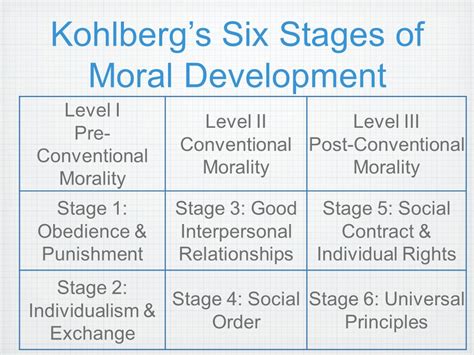The Evolution of Moral Thinking: 6 Stages

“How do we make ethical decisions? A journey through the six stages of moral development.”
Human morality is an ever-evolving concept, one that has intrigued philosophers, psychologists, and thinkers for centuries. The question of how we develop our sense of right and wrong has been a subject of intense study, and a notable framework emerged from the work of Lawrence Kohlberg, a psychologist who dedicated his career to understanding moral reasoning. Kohlberg’s theory, known as the Stages of Moral Development, offers a fascinating insight into how our moral thinking evolves. Let’s explore these stages and the insights they provide into the human conscience.
Stage 1: Obedience and Punishment

At the earliest stage of moral development, individuals perceive rules and moral standards as absolute and unchanging. Morality is external, and the focus is on avoiding punishment. Children at this stage often equate ‘good’ behavior with avoiding consequences rather than an intrinsic understanding of right and wrong. For example, a child might refrain from stealing a toy not because they understand the impact on the toy’s owner but because they fear being scolded or punished.
Stage 2: Individualism and Exchange

As individuals progress, they begin to recognize that others have their own needs and desires. Morality becomes a matter of reciprocity and fair exchange. People at this stage tend to think in terms of “what’s in it for me?” and “what’s fair?” For instance, a child might share their lunch not out of empathy for a hungry classmate but because they expect the favor to be returned.
Stage 3: Interpersonal Relationships and Expectations
Now, morality becomes a matter of maintaining social relationships and meeting societal expectations. Individuals start to understand that others have feelings and that their actions can impact these relationships. For instance, a child might refrain from telling a lie to avoid hurting their friend’s feelings or damaging their trust.
Stage 4: Maintaining Social Order
In this stage, individuals begin to understand the importance of maintaining societal order and adhering to laws and rules. Morality becomes a matter of upholding the greater good and ensuring social harmony. People at this stage might support a law not because they personally agree with it but because they recognize its importance for societal stability.
Stage 5: Social Contract and Individual Rights

Individuals at this stage develop a more sophisticated understanding of society and its laws. They recognize that laws are agreements made between individuals for the common good, and that these laws can be revised or challenged if they violate individual rights. For instance, an individual might advocate for changing a law that they believe infringes on civil liberties.
Stage 6: Universal Ethical Principles
The final stage of moral development represents a profound understanding of ethics. Individuals recognize that certain ethical principles, such as justice, equality, and human rights, transcend cultural norms and laws. Morality becomes a matter of upholding these universal principles, even when they conflict with societal norms or laws. An example could be an individual standing up against an unjust law, risking their own well-being to defend a higher ethical standard.
While Kohlberg’s theory has been influential, it’s important to note that not everyone progresses through these stages in a linear fashion. Some individuals might remain at a particular stage for their entire lives, while others might regress during times of stress or personal crisis.
This theory provides a valuable lens through which to understand the complexities of human morality and how it develops over time. It invites us to reflect on our own moral thinking and how we might strive to move towards a more ethically mature perspective.
FAQ
At what age do children typically reach Stage 3 of moral development?
+While the exact age can vary, most children reach Stage 3, where they begin to understand the impact of their actions on others, between the ages of 7 and 10. This stage is often associated with the development of empathy and a more sophisticated understanding of social relationships.
Can adults regress to earlier stages of moral development?
+Yes, it’s not uncommon for adults to regress to earlier stages of moral development during times of stress or personal crisis. For instance, an adult might resort to selfish behavior or a “what’s in it for me?” mindset when facing significant life challenges.
Are there cultural variations in the stages of moral development?
+While Kohlberg’s theory provides a universal framework, there can be cultural variations in how individuals progress through these stages. For instance, some cultures may place greater emphasis on collective well-being, potentially influencing the timing and nature of moral development.
How can parents and educators support children’s moral development?
+Parents and educators can foster moral development by encouraging children to think critically about ethical dilemmas, providing opportunities for perspective-taking and empathy, and modeling ethical behavior themselves. Discussing real-life scenarios and asking children to consider the feelings and perspectives of others can be particularly effective.



